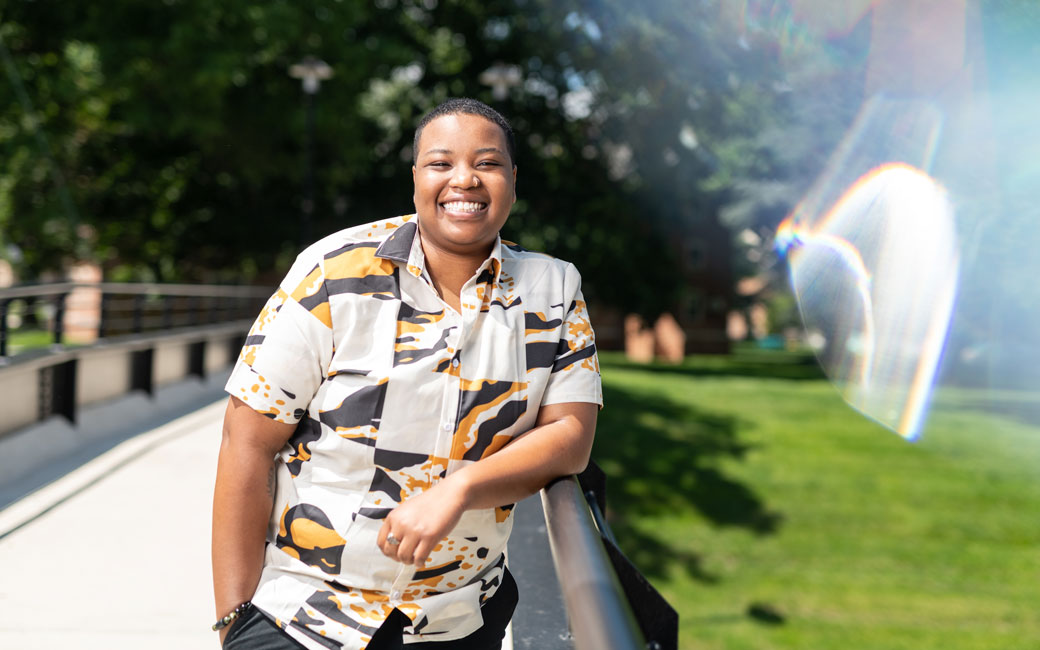Graduate student hopes research helps members of the LGBTQIA+ community
Brianna Donaldson-Morton traveled nearly 800 miles to conduct research at TU
By Kyle Hobstetter on June 29, 2022

A lot of people ask what led Brianna Donaldson-Morton to Towson University.
The second-year graduate student is from Milwaukee, Wisconsin, and earned undergraduate degrees in biology and psychology from the University of Wisconsin-Whitewater.
But for Donaldson-Morton, the answer is pretty cut and dry. They traveled almost 800 miles to be part of Towson University’s experimental psychology graduate program and to conduct research with psychology Professor M. Paz Galupo.
“Research is what brought me to TU, because the research I want to work on involves gender and sexuality and its intersection with race,” Donaldson-Morton says. “I came to TU specifically to work with Dr. Galupo because that’s a lot of what she does.”
Growing up, Donaldson-Morton came from a family of medical professionals. And for a while, they planned to become a doctor or a nurse, with much of their undergrad research focusing on subjects like physics and neuroscience.
But while they found a passion for research, Donaldson-Morton discovered they weren’t fulfilled by the subjects they were investigating.
After working at their previous university’s Pride Center, Donaldson-Morton started to recognize different issues within the LGBTQIA+ community, specifically for students of color.
“We didn’t have a lot of students of color coming into our space,” Donaldson-Morton says. “I started to ask myself ‘Why are we not seeing students of color utilizing this space as much as our white students are?’”
That question inspired their research at Towson University.
After leaning more towards their biology degree in their undergraduate research, they plan to focus on the psychology aspect of their education.
“We hear about the research and the statistics of depression rates among LGBTQIA+ people are higher than their cis[gender] counterparts, but there isn’t a lot of focus on the Black community,” Donaldson-Morton says. “There is not a lot of research that focuses on the queer Black community. That's where I want my research to go.”
Another influence on Donaldson-Morton’s research interest is their own identity. They identify as a Black, American, masculine of center (a phrase that indicates a personal understanding for lesbian/queer women who present and relate to others in a masculine way), lesbian woman.
Donaldson-Morton reminds themselves to not lean too much on personal experience.
“This research is important for my own self-exploration,” Donaldson-Morton says. “But at the same time, remembering that I am the one doing this research, so I have to keep in mind, when I'm looking at stuff, to not rely too heavily on my own biases.”
Donaldson-Morton also holds a graduate assistantship in the Center for Student Diversity (CSD).
In the role, they have mainly worked with TU’s LGBTQIA+ student population but have also been able to meet with other students in CSD.
“Having that experience where I can actually do student-facing work, and interact with students has been really nice,” Donaldson-Morton says. “I didn’t start my academic career at TU, so being a part of the CSD has allowed me to feel like I’m part of the TU community.”
“Brianna has been a wonderful addition to the team and has brought many creative ideas to the Center for Student Diversity,” says Christa Gloster, CSD’s coordinator of sexuality and gender diversity. “She is passionate about access and equity for marginalized groups. This especially holds true for LGBTQIA+ people and folks of color.”
With one more year left at TU, Donaldson-Morton is already looking at doctorate programs in psychology, with a focus in women’s and gender studies.
They also hope to keep doing research and making it more accessible, not only to those who need it, but those who can use it to create change.
Donaldson-Morton believes they are closer to accomplishing these goals thanks to their experience at TU.
“TU has helped me to become a better researcher,” they say. “And through the CSD, I’m making so many connections through the community organizations we work with. So, I’m not only broadening my personal network, but also my professional network.”